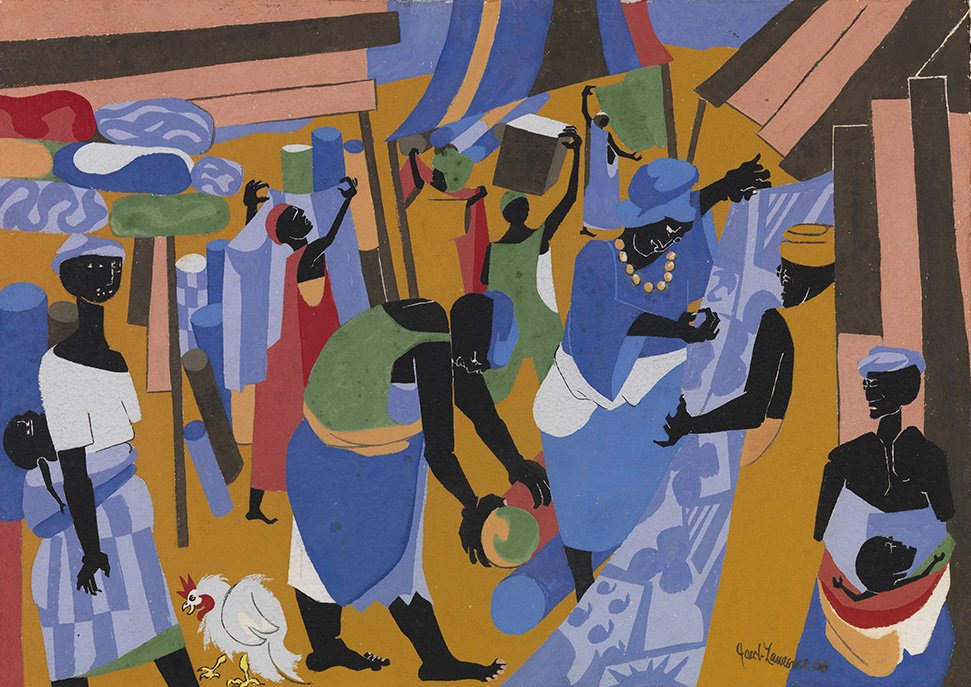How African Philosophy Shaped West African Art
jacob-lawrence-black-orpheus
Africa, the cradle of civilization, is a continent rich in history, culture, and wisdom. It is home to a diverse range of philosophical traditions that have shaped the way people think, perceive the world, and express themselves. African philosophy is often overlooked in mainstream conversations, but its influence can be seen in various aspects of African culture, including the vibrant and captivating art of West Africa.
West African art: A cultural expression
West African art is a testament to the creativity and ingenuity of its people. From the intricate wood carvings of the Akan people in Ghana to the striking masks of the Dogon people in Mali, West African art is renowned for its beauty and symbolism. It encompasses a wide range of artistic forms, including sculpture, painting, textiles, and pottery. Each piece of art tells a story and reflects the cultural heritage and beliefs of the people who created it.
The connection between African philosophy and West African art
African philosophy and West African art are deeply intertwined. African philosophy, unlike Western philosophy, is not concerned with abstract concepts or intellectual debates. It is rooted in the lived experiences and wisdom of the African people. Similarly, West African art is not just about aesthetics; it is a means of communication, storytelling, and cultural expression. It serves as a visual representation of African philosophy, conveying its values, beliefs, and worldview.
Symbolism in West African art influenced by African philosophy
Symbolism plays a significant role in West African art, and it is heavily influenced by African philosophy. Each symbol used in a piece of art carries a specific meaning and serves as a visual language to convey important messages. For example, the Adinkra symbols of the Akan people are rich in symbolism and represent various concepts such as wisdom, unity, and spirituality. These symbols are not just decorative elements; they are a reflection of African philosophical ideas and teachings.
The role of spirituality in West African art
Spirituality is a fundamental aspect of African philosophy, and it is intricately woven into the fabric of West African art. Many West African artworks are inspired by religious and spiritual beliefs, reflecting the close relationship between the material and the spiritual world. From the iconic Benin bronzes to the Yoruba sculptures depicting deities, spirits, and ancestors, West African art is infused with a sense of the sacred. It serves as a bridge between the physical and the metaphysical, inviting viewers to connect with the divine.
Cultural identity and African philosophy in West African art
West African art is a powerful expression of cultural identity and pride. It reflects the unique history, traditions, and values of the diverse ethnic groups in the region. African philosophy emphasizes the importance of community, ancestral knowledge, and respect for the elders. These values are reflected in West African art, which often portrays scenes of communal activities, family life, and cultural ceremonies. Through their art, West African artists celebrate and preserve their cultural heritage, ensuring that it is passed down to future generations.
Famous West African artists influenced by African philosophy
Throughout history, there have been many talented West African artists who have been deeply influenced by African philosophy. One such artist is El Anatsui, a Ghanaian sculptor known for his large-scale metal and wood installations. His works explore themes of identity, globalization, and the environment, drawing inspiration from African philosophical concepts such as interconnectedness and the cyclical nature of life. Another renowned artist is Ben Enwonwu, a Nigerian painter and sculptor whose works celebrate African culture and challenge Eurocentric notions of beauty. These artists, along with many others, have used their art to amplify African philosophy and challenge prevailing narratives.
Contemporary interpretations of African philosophy in West African art
While traditional forms of West African art continue to thrive, contemporary artists are also exploring new ways to interpret African philosophy. They are pushing boundaries, using different mediums, and engaging with contemporary issues to create thought-provoking artworks. For example, some artists are using photography and digital media to challenge stereotypes and reclaim African narratives. Others are using performance art and installation to explore the impact of colonialism and globalization on African identity. These contemporary interpretations of African philosophy in West African art ensure its relevance and vitality in a rapidly changing world.
Preserving and promoting African philosophy through West African art
In an increasingly globalized world, it is crucial to preserve and promote African philosophy and its connection to West African art. This can be done through various means, such as supporting and showcasing the work of West African artists, establishing cultural institutions and museums dedicated to African art, and incorporating African philosophy into educational curricula. By valuing and elevating African philosophy, we can ensure that it continues to inspire future generations and foster a deeper understanding and appreciation of African culture.
The enduring legacy of African philosophy in West African art
African philosophy has left an indelible mark on West African art. Its influence can be seen in the symbolism, spirituality, and cultural identity expressed through the vibrant artworks of the region. From ancient sculptures to contemporary installations, West African art continues to serve as a powerful medium for transmitting African philosophical ideas and values. By recognizing and celebrating the wisdom embedded in African philosophy, we can uncover hidden truths, challenge existing narratives, and embrace a more inclusive and holistic understanding of art and culture.

